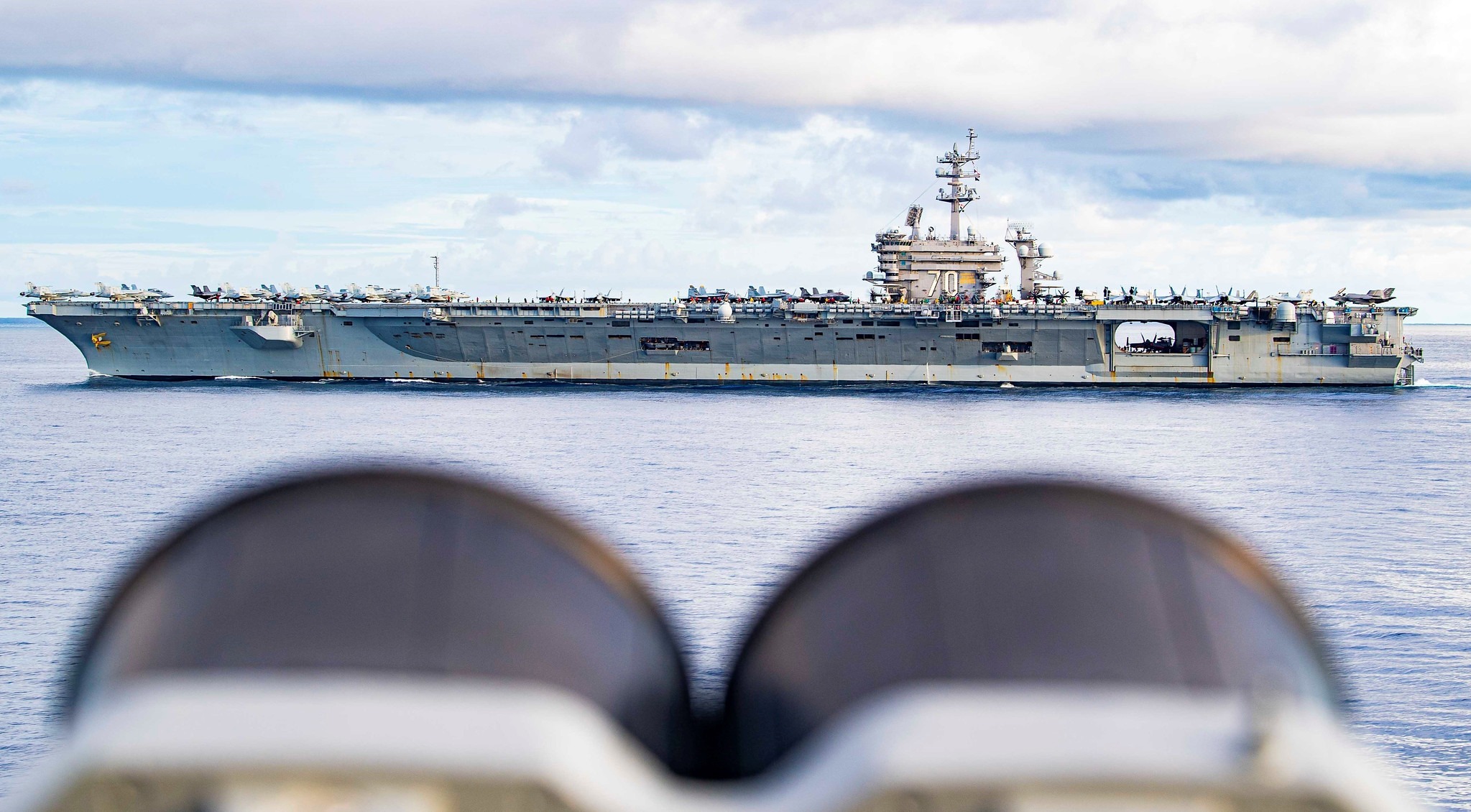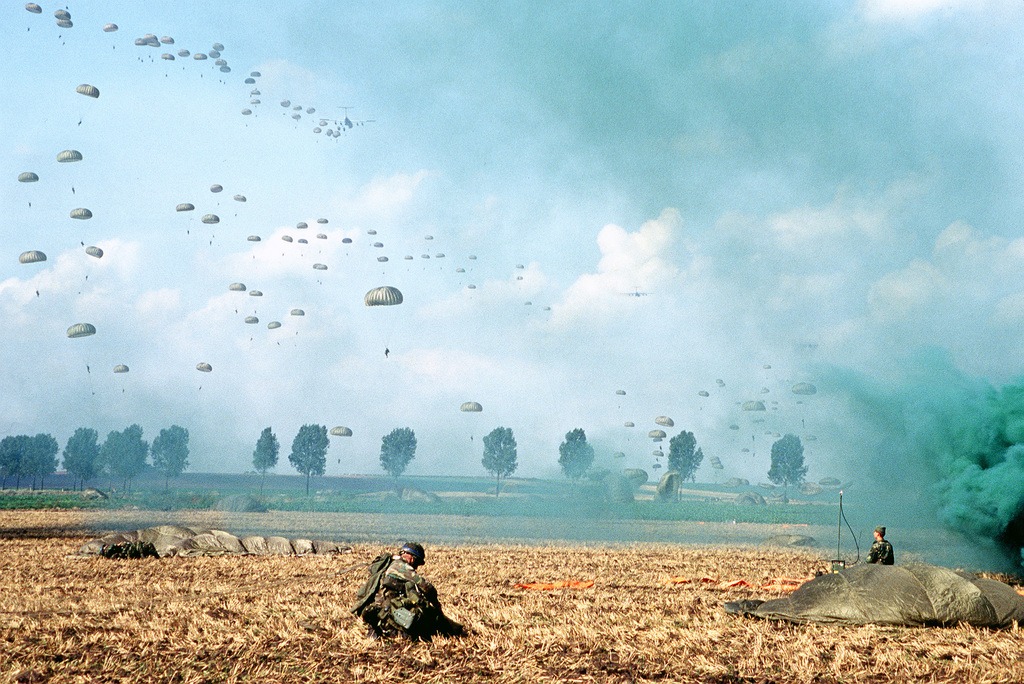The Risk of Accidental War Is Highly Exaggerated

By Julien Oeuillet
Staff Writer
27/9/2021

US Nimitz-class aircraft carrier USS Carl Vinson (Picture Credit: U.S. Pacific Fleet)
Rising tensions between China and other countries in the Asia-Pacific has birthed a trend: fearmongering about a war that would start involuntarily, based on accidents and miscalculations. Many fear that an exchange of fire between forces in the South China Sea or the Taiwan Strait could trigger a series of escalations that results in a major war.
In January 2020, John Blaxland, Professor of International Security and Intelligence Studies at the Australian National University, wrote a report in January 2020 warning of “accidental or inadvertent” conflict with China. Writing for National Review in June 2020, Michael Auslin, a research fellow at Stanford University’s Hoover Institution, speculated that a war between China and the United States might “beg[i]n with a series of accidental encounters in the skies and waters.” In August 2020, Zhou Bo, Director of the Centre for Security Cooperation in the Office for International Military Cooperation at China’s Ministry of National Defense wrote in the Financial Times about how naval vessels colliding in the South China Sea might trigger a direct conflict. In an article in Bloomberg in December 2020, Karen Leigh, Peter Martin, and Adrian Leung noted that “fears have grown that a miscalculation between warships could spark a wider military confrontation.”
But such a scenario is extremely unlikely. In fact, its constant repetition only serves to undermine efforts to contain China. In a 2015 article in The Diplomat, American naval officer Steven Stashwick on how the risks of “accidental war” are exaggerated: the Cold War, he noted, saw hundreds of events that could have been seen as triggers for a full-scale conflict that actually never happened. American researcher Hal Brand wrote in Bloomberg about how there are no real examples of a genuine accidental war that actually started by accident. I attempted to find such an example myself, and the closest I could find was the ridiculous “Pig War,” an incident in 1859 wherein the shooting of a stray pig by a farmer almost triggered a conflict between the United States and the United Kingdom over a contested island in the Puget Sound. Although it made both countries dispatch troops to the disputed area, its main consequence was to force them to finally resolve the ambiguous border once and for all before any human was shot.
Nonetheless, the fear of accidental war has deep roots. The assassination of Archduke Franz Ferdinand by Serbian anarchist Gavrilo Princip, which is often credited for starting WWI, is one of the most famous myths about accidental war. Hal Brand even mentioned it as a counter-example. But the assassination was only a convenient excuse for warmongering nationalists: any similar event would have triggered the war. If someone were to pull a Princip in East Asia, it would not “accidentally” lead to war, it would be one of many possible excuses for a premeditated conflict.

Assassination of Archduke Franz Ferdinand, by Felix Schwarmstadt
Closer to us, the Cold War, constantly compared to the present situation between China and the US and its allies, provides a lot of such cautionary tales. One of the most popular is that of Stanislav Petrov in September 1983: a Soviet radar officer, he correctly interpreted a signal apparently indicating five incoming American missiles as a technical glitch and declined to alert his superiors until corroborating evidence arrived (which didn’t). Petrov’s wisdom, the tale goes, prevented a nuclear retaliation by his war-mongering superiors and the resulting Armageddon.
But that gives the misleading idea that Petrov was the only one who would have decided whether the Soviets would launch their nukes or not. His discretion was not the only shield against an automatic, knee-jerk, apocalyptic response. Petrov’s reasoning that a genuine American attack would have involved more than just five missiles, and thus the signal was a glitch, would have been picked up by someone else in the chain of command. As a radar operator, his duty was to report what he saw, and the men above him would probably have dismissed the false alarm themselves: they never relied solely on Petrov’s word. Petrov is often hailed as a hero, but actually he just didn’t have the nerves to perform his duty.
Another, more serious, incident happened in 1995 when Russian radars mistook a research rocket launched from Norway for a submarine-launched American missile. Then Russian president Boris Yeltsin went as far as logging into his “nuclear briefcase” (the portable system used to trigger a missile launch), reportedly the only time in history this happened. Interestingly, and contrarily to Petrov’s assumption that a first strike would not start with a lone missile, the Russians were wary that the first weapon launched could release an electromagnetic pulse capable of disabling radars (and thus their ability to detect and retaliate against subsequent attacks), before the rest of the missiles would be launched. Yet, Yeltsin did not retaliate: even with a window as short as 10 minutes. It was soon determined the missile was heading north rather than east, and that this was another false alarm.
Even the most seemingly dangerous heads of state are rational enough, and so is the apparatus that surrounds even the most authoritarian strongman. In 2015, Turkey shot down a Russian jet fighter operating in civil war-ridden Syria that had strayed into Turkish territory. At the time, speculation was rife that this accident might trigger a war. Both sides screamed, Recep Erdogan and Vladimir Putin both rattled their sabers, a multibillion dollar project for a natural gas pipeline linking the two countries was cancelled, and since Turkey is a NATO member, the organization declared support for Ankara. By 2016 however, the two countries had reconciled, construction of the “TurkStream” pipeline commenced, and when Erdogan survived a coup, Putin was the first to show support. The Russian pilot’s life was not avenged with a sea of blood. No country will go to war for the sake of sentinels shot at the border.
Even the most seemingly dangerous heads of state are rational enough, and so is the apparatus that surrounds even the most authoritarian strongman.
Even a series of hostilities between two countries who view each other as enemies didn’t start a war in 2020. On 3rd January that year, the US used a drone to assassinate Iranian General Qasem Soleimani, who headed the Islamic Revolutionary Guards Corps. Five days later, in retaliation, Iran launched over a dozen missiles at two American bases in Iraq. To make things even worse, the Iranians then confused a Ukrainian airliner with an American missile and shot it down, killing all 176 people on board. Many at the time feared a war would result. Instead of going to war, though, both countries deescalated the situation. The Iranian missile strike seemed designed to avoid US casualties, and then-US President Donald Trump played down the extent of the strike, stating that there were no casualties and that the bases sustained “only minimal damage.” When it later emerged that several US servicemembers at the bases had suffered concussions from the strike, this was played down too.
Another popular tale of an almost accidental war is that of the Able Archer ’83 incident. Able Archer ’83 was a real-scale military exercise by American-led NATO forces in Western Europe in November 1983. It involved heads of states and militaries of NATO countries simulating a nuclear war. NATO members did not realize the extent to which the KGB was able to watch their every move, and the Soviet leadership witnessed the exercise in all its details – except one, the story goes: it failed to realize it was an exercise. Purportedly, Moscow answered by readying its own forces for war, including its nuclear weapons. At its peak, the Soviets may have been on the verge of striking first in anticipation of what they believed was a full-scale first strike. Some fear something similar might happen with China. What if Beijing misinterprets an exercise – or any harmless move – and attacks the US or its allies in response? The nuclear apocalypse that we narrowly escaped in 1983 in Europe might finally happen in the 2020s in East Asia.
But that account of Able Archer ’83 may not be true. The story only came to light in 1985 once KGB Colonel Oleg Gordievsky, the highest-ranking defector in the history of the Cold War, talked about it during his debriefing. Marshall Sergei Akhromeyev, chief of the main operations directorate of the Soviet General Staff at the time, said he never heard of Able Archer – but he did know of Reforger, the code name of a wider NATO exercise. Able Archer was merely the tail end of an almost year-long Reforger exercise that involved tens of thousands of American troops brought to West Germany: if there had been a risk in 1983, it was not due to a mere “misunderstanding” during the two weeks of Able Archer but to the year-long, massive build-up of forces as part of Reforger. To reach a situation comparable to the Reforger exercise, it would require a long and massive mobilization of troops by all of China’s neighbors – not the usually short and specific military exercises conducted by the US and its allies in the region.

US 82nd Airborne Division air traffic controllers coordinate on radio with C-141B Starlifter aircraft as the other members parachute from the aircraft during exercise Reforger ’80
However, these tales of close calls remain popular. Western schoolchildren learn of how Gavrilo Princip’s bullet sparked WWI. Petrov is lionized as a pacifist champion. Their stories condition people to think that any force approaching waters claimed by China might trigger a Chinese retaliation. Conversely, we are led to believe that any trespassing Chinese ship or plane should be left alone, since shooting them would be the equivalent of Gavrilo Princip shooting Archduke Franz Ferdinand. There may not be a noble soul like Petrov in the Chinese military to save us this time, so let’s let China do whatever it wants for the sake of humanity.
On the surface, these analogies make for exciting stories, but none of them survive a deeper analysis. Princip was a pawn in a giant system of alliances. Petrov was one knot in a large safety net. Able Archer was one part of a much larger exercise. Even the downing of a Turkish jet or the assassination of an Iranian general ended up as historical footnotes.
In truth, the fear of accidental war is inflated – and many malign actors will use that fear to their own advantage. An alternative theory on Able Archer is that the Soviets themselves spread the false story that they had almost been scared into accidentally starting a nuclear war to spook the Western powers into disarming and becoming less assertive. They feigned fear in order to scare the West, effectively planting the idea that too much defense against them could mean annihilation. Indeed, Gordievsky’s story had a sobering effect on then-US President Ronald Reagan and his administration, who were stunned to discover that his aggressive rhetoric was taken seriously by his opponents. It is said to have factored into Reagan’s decision to seek arms limitation treaties with the Soviet Union.
The fear of accidental war is inflated – and many malign actors will use that fear to their own advantage.
Of course, a healthy fear of war is legitimate, and no one wants trigger-happy madmen commanding countries’ armed forces. But an excessive and irrational fear of accidental war based on a misunderstanding of historical events is also dangerous, especially when it paralyzes people and prevents them from standing up for themselves and for what’s right. China, for one, will be eager to exploit this fear, to portray reasonable moves to check its bullying as dangerous brinkmanship. Western governments, politicians, and experts need to make an effort to inform voters that defending East Asia against Chinese aggression is not warmongering, and that the forces present in the region are obeying a rational, well-established chain of command that will not escalate more than necessary. They should also explain that the Chinese government is rational enough to have similar safeguards and is unlikely to get into a war accidentally.
Overly dramatic accounts of close calls, of accidental war or nuclear annihilation narrowly avoided, may make for good stories, evoking in listeners a shiver of existential terror, but they make for poor policymaking. We should push back against the exaggerated fear of accidental war, this persistent myth that defending ourselves and our friends is a danger to our security.
